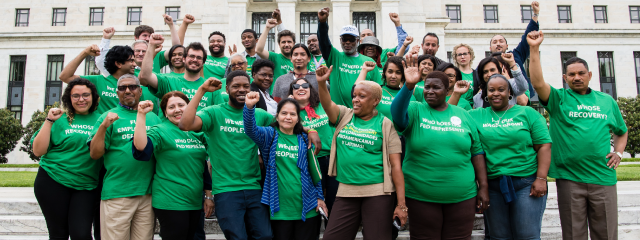Blog
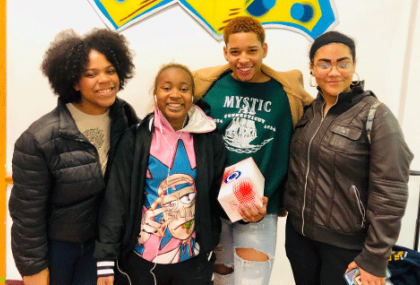
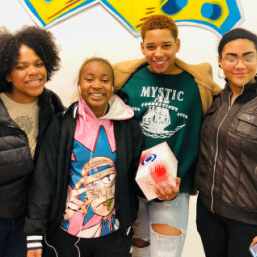
In March 2019, CPD’s Education Justice Campaigns and Organizing and Capacity Building teams convened three emerging youth organizing groups that are gearing up to dismantle the school-to-prison pipelines in their respective cities. Youth leaders from Leaders Igniting Transformation (LIT), Milwaukee; the Youth Power Collective (YPC), a campaign of OnePA, Pittsburgh; and from Good Jobs Now (GJN), Detroit all gathered in Milwaukee for three days of training and campaign planning.
Together, these youth leaders came up with bold visions and plans to achieve them. They want hundreds, even thousands, of their peers to come together to create a more just, safe and inclusive schools. They want cops out of schools. They want their schools and communities to have the support and resources that provide them with the opportunities to grow and the freedom to thrive.
Each of these goals will require young people to build power in their communities. The organizations came together to learn from one another, deepen their youth organizing practice, and to plan for the year ahead. To build fierce and robust youth power, each of the organizations is developing their organizing models, which includes base-building strategies and leadership development practices. The convening was also a time for the organizations to build relationships with each other and learn and work together in pursuit of these goals. Their campaign plans prioritized CPD’s commitment to building a powerful and aligned youth base across the network.
The youth from these organizations were also prominent leaders of the national #YouthDemand campaign, which set out to challenge the DeVos School Safety Commission, whose recommendations would further entrench the racially discriminatory school-to-prison pipeline. The #YouthDemand campaign collected thousands of signatures and endorsements from almost 50 organizations across the country—all demanding a school safety plan that rejects the further militarization of our schools, divests from police in schools, and removes metal detectors and punitive school discipline practices. Instead, they are for investment in mental health and counselling services and increased teacher salaries, among other things.
Now these youth have turned their attention to movement-building at the most local level, in their schools and communities, to ensure that what the #YouthDemand—the freedom to thrive —becomes a powerful rallying call that begins with targeting and dismantling the systems that criminalize Black and Brown youth in their places of learning. These youth demand big changes, and CPD will be there to support them in realizing their bold vision for the future. Please make a donation to support this critical work today.
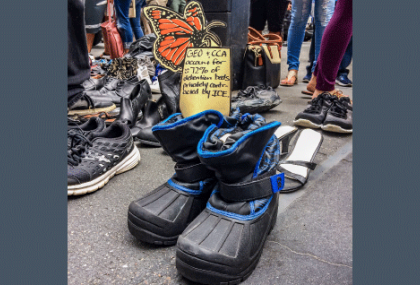
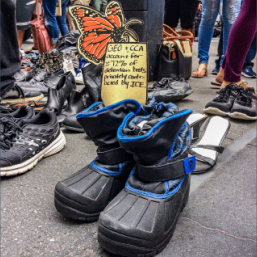
On April 9, In the Public Interest, the Public Accountability Initiative, and CPD jointly published a data brief The Wall Street Banks Still Financing Private Prisons. The first comprehensive data of this type released in the last two years, the brief highlights the major Wall Street banks that finance the multibillion-dollar private prison companies: CoreCivic and GEO Group. The brief reveals that Wall Street banks provide over $2.6 billion in credit and loans, making them complicit in the Trump administration’s hateful anti-immigrant agenda. Nearly 75% of immigrants detained are held in private prisons whose stock prices have soared against the backdrop of Trump’s zero tolerance and family separation policies. Read the full data brief here.
Since Trump’s election, immigrant rights advocates have joined forces under the banners of #FamiliesBelongTogether and #BackersOfHate to urge Wall Street banks to cut their financial ties with Geo Group and CoreCivic. After years of coordinated action, shareholder resolutions, and mounting public pressure, JPMorgan Chase and Wells Fargo agreed to sever ties with the private prison industry in March 2019. On the heels of that victory, the data brief highlighted that other Wall Street banks who are still financing private prisons. Bank of America is the only top six US bank that is currently lending to private prison companies and has not committed to ending its financing relationships with the industry. In addition to its long-standing financing of private prison companies, Bank of America has developed a close relationship with Caliburn, a new corporate conglomerate that is the only for-profit entity running migrant children detention facilities.
The data brief was released in advance of an April 10 US House Committee on Financial Services hearing on holding megabanks accountable. Immigrant rights advocates from CASA in Action, Moms Rising, Families Belong Together, and CPD attended the hearing, then rallied in front of SunTrust and across from Bank of America—two of the banks profiled in the data brief with significant financing relationships—to demand that they stop these practices.
We have proven that together we can stop this. Make a donation to support this campaign and tell Bank of America to stop financing for-profit immigrant detention centers. Let’s shine a light on this complicity, and let’s put a stop to it.
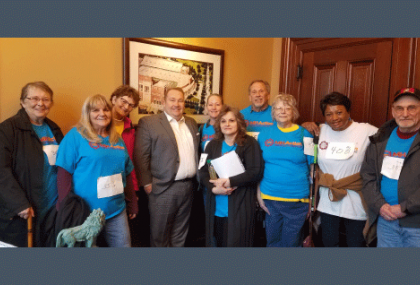
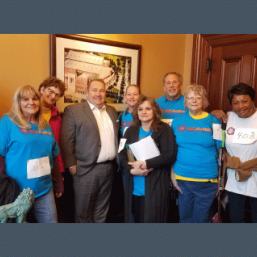
Local leadership teams of residents of manufactured home communities (historically known as trailer parks) are building an inspiring movement to ensure that all families have access to decent, affordable housing in healthy communities. As manufactured home communities are being gobbled up by greedy, predatory investors for huge profits, MHAction leadership teams are working with allied tenants’ groups and organizations across the country to push for increased protections, such as rent control and good cause eviction.
For several years, MHAction community leaders from Illinois have been working closely with city and suburban housing justice organizations, like the Kenwood Oakland Community Organization (KOCO), another CPD affiliate, to lift the statewide preemption ban on rent control. MHAction leaders have been hosting community forums, activating their neighbors on social media and at their doors, and participating in direct actions on corporate owners to highlight the need for rent control protections. Illinois’ statewide collaboration, the Lift the Ban coalition, has been engaging key decision makers across the state and building a sense of solidarity between residents of manufactured home communities and renters. MHAction leaders recently held meetings in Springfield, IL with key decision makers on this important issue.
This May, MHAction leadership teams will be coming together for a national leadership retreat. MHAction leaders from seven states will engage in trainings and actions to develop their narrative and political analysis skills using a gender, racial, and class justice lens. Together, they will build and strengthen vibrant, energetic, purpose-driven leadership teams to carry out MHAction’s 2019 organizational work plan. In order to pull off this gathering, MHAction leaders need your financial support! Please donate to MHAction to make their May gathering a reality and support the work of MHAction’s leadership teams. Make a donation today!
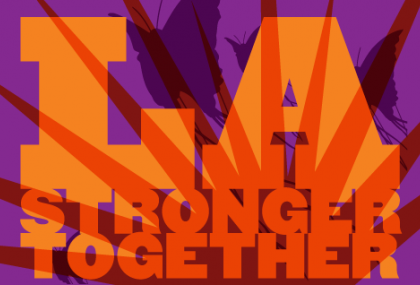
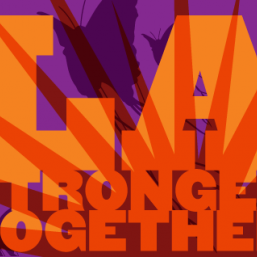
We’re incredibly excited to announce that actor, writer, and activist Kendrick Sampson will be our master of ceremonies at CPD’s Stronger Together LA Benefit on May 23! Kendrick hails from Houston, Texas where he was raised in a family of musicians and artists. Kendrick’s acting credits include How to Get Away with Murder, The Vampire Diaries and, most recently, as Nathan on the hit HBO series Insecure. Kendrick uses his voice to empower marginalized communities and to shine a light on issues of inequity. Learn more about Kendrick here.
Please join us for an empowering celebration of grassroots organizing, progressive change, and building people power that allows us all the freedom to thrive. Get your tickets today! This year’s honorees are advocates and activists who are working to create transformative change in their state of California and nationwide:
NONPROFIT LEADER Dr. Robert K. Ross President & CEO of The California Endowment
PHILANTHROPIST Tom Steyer Climate Activist, Founder of NextGen America & Need to Impeach
and BIRDDOG ACTIVISTS Christopher Noxon Writer, Activist & Author of "Good Trouble: Lessons from the Civil Rights Playbook"
Chris Bubser Community Leader & Co-Founder, Hang Out Do Good
CPD, together with our 53 affiliates across 131 cities, 34 states, and Puerto Rico, is on the forefront of the national movement to fight back and resist attacks on our nation and its values. Read more about our honorees on our website and be sure to mark your calendar for Thursday, May 23, 2019!
CLICK HERE TO PURCHASE TICKETS or BECOME A SPONSOR


Local Progress is a network, housed within CPD, that supports progressive elected officials, facilitates best practice sharing, and connects members in their shared efforts for a more equitable and just future for communities across the country. One of the most elusive challenges faced by localities large and small across the country is to plan for growth and the decades to come in an inclusive way that rectifies historical injustice. Fortunately, this past year, Minneapolis succeeded in providing a north star from which communities all over can draw inspiration.
On March 15, Local Progress hosted a webinar about Minneapolis 2040, the city’s comprehensive plan, which the council passed in late 2018 after an in-depth three year process. The webinar featured Council President Lisa Bender, Councilmembers Phillipe Cunningham (ward 4), and Jeremiah Ellison (ward 5) and Long-Range Planning Director Heather Worthington.
The content focused on several aspects of the plan: process and timeline, key highlights, and the political conditions that made it feasible in the first place. In particular, the city grounded the work in the community through a robust effort to solicit widespread engagement from start to finish, which included the creation of a Civic Engagement Plan to help ensure efficiency and transparency. This commitment to community engagement produced a clear need for a long-term vision of the city grounded in racial equity that could begin to address past historical injustices. The goals of the legislation include eliminating disparities, creating affordable and accessible housing, and fostering a healthy, safe and connected populace, to name just a few.
Local Progress members share in the desire to see their cities and future growth serve everyone, not just those at the top of the wealth scale. In many cases, growth and economic development intentionally leaves people behind, particularly communities of color. Historically, communities have often been left out of decision-making and deprived of the ability to build wealth. Minneapolis acknowledges that there are systemic and racist barriers which they must address to move forward building a vision of their city that is for everyone. The Minneapolis plan 2040, both in creation and design, offers an exciting case for cities seeking to realize similar commitments to equity and justice for their communities. Watch the webinar here.
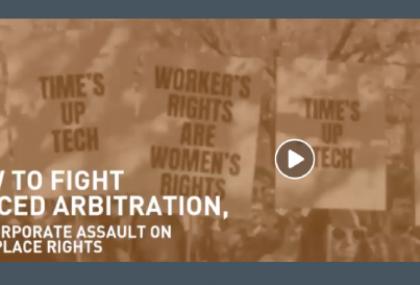
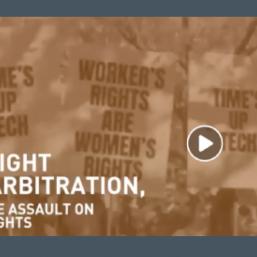
In a webinar on March 5, CPD’s Rachel Deutsch spoke with Tanuja Gupta from End Forced Arbitration, an alliance of Google workers, and Reyna Lopez from the CPD affiliate PCUN in Oregon, about corporate use of forced arbitration to strip workers of their rights – and what we are currently doing to fight back. Watch the webinar here.
Corporations now force over half of American workers to sign arbitration clauses that waive their right to go to court if they ever experience injustice in the workplace. Instead, these workers’ only recourse is to arbitrate their claim before a private arbitrator (often hired by the company), usually in secret. It’s so difficult for workers to win in arbitration that an estimated 98% of legal claims are simply abandoned when the only option is arbitration. The large and growing scale of forced arbitration has a chilling effect on workers seeking to vindicate their rights in areas ranging from overtime and minimum wage to discrimination and sexual harassment.
But CPD and our allies are fighting back. Tanuja explained how Google employees organized a 20,000-employee walkout in November that eventually drove the company to give up arbitration for employment disputes. An offshoot of that walk-out, the End Forced Arbitration campaign, is now organizing workers across tech to pressure their employers to abandon forced arbitration.
The most effective way to address forced arbitration is to change the law. Earlier this year, Congress introduced the Forced Arbitration Injustice Repeal (FAIR) Act (H.R.1423 and S.610) to make forced arbitration clauses unenforceable.
And as Reyna explained, state and local governments can pass laws to reinvigorate workplace rights by strengthening public enforcement agencies and giving them new tools to partner with workers and community organizations. By empowering workers to pursue legal penalties on the government’s behalf, states and cities can preserve access to court even for workers restricted by arbitration clauses, similar to a law currently in place in California. Some of the penalty revenue should be allocated for community organizations to educate immigrant workers, low-wage workers, and other vulnerable worker populations about their rights and assist them in pursuing justice. CPD affiliates and their allies are campaigning to expand this model to six other states: New York, Massachusetts, Washington, Oregon, Maine, and Vermont.
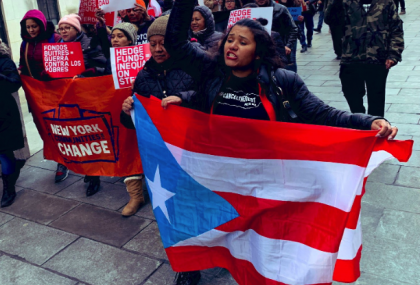
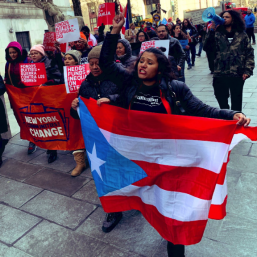
On March 13, in conjunction with a federal hearing held by Judge Laura Taylor Swain, CPD affiliates, activists and ally organizations held actions across the country to demand the $6 billion in illegal debt to corporate entities be canceled. Before Hurricane Maria made landfall in 2017, Puerto Rico was already facing a fiscal crisis created by austerity measures that benefited private corporate interests. This illegal crippling debt negatively impacts communities both on the Island and within the Puerto Rican Diaspora in the U.S.
The #CanceltheDebt actions were covered most notably by Latino Rebels, Democracy Now, Telemundo, and El Nuevo Día, and also made headlines in smaller local outlets. Further, these actions served as the official release of a new campaign working to hold accountable those who are profiting from the Puerto Rico’s financial crisis, and to build new debt agreements led by and for the people of Puerto Rico. The actions started in Puerto Rico, where Construyamos Otro Acuerdo, a coalition that includes CPD, Colectivo Feminista en Construcción, Frente Por La Auditoría de La Deuda, Unions and other organizations occupied a building to protest UBS Bank and their involvement in creating, financing and profiting from the $6 billion of illegal debt.
In New York, hundreds rallied in front of the federal courthouse to demand that Judge Swain cancel the illegal debt. This action was led by CPD affiliates and allies New York Communities for Change, Churches United for Fair Housing, and Vamos4PR among others. In Nevada and Orlando, activists from Vamos4PR, Organize Florida and Make the Road NV rallied in front of Bank of America and Morgan Stanley for their role in creating and profiting from the illegal debt, and demanded that the Fiscal Oversight Board take immediate action to prosecute these cases.
There is a long fight ahead of us. Hurricane Maria lifted the veil on the impact of colonialism, austerity, structural racism, and climate change that has left Puerto Rico systemically stripped of fundamental rights and the basic elements of a just economy. The CPD Network is committed to supporting the vision and leadership of Puerto Rican people and will continue to hold those in power accountable. Join us by making a meaningful donation today.
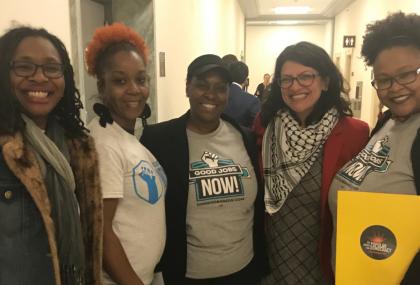
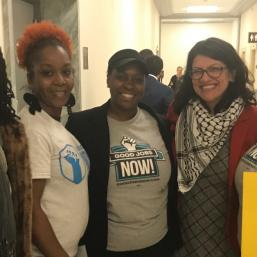
From March 25-27, CPD affiliates from across the country came together to strategize and unify the vision for CPD Housing Justice Campaigns at the local, national, and federal levels. CPD affiliates ACCE (CA), Make the Road Nevada, Good Jobs Now (MI), Kenwood Oakland Community Organization (IL), CASA (DC), Organize Florida, New York Communities for Change, Churches United for Fair Housing (NY), Make the Road New York, SPACES, Maryland Communities United, MHAction (National), and Action NC convened to share victories and strategies for building power around housing justice and create alignment for a federal housing justice strategy.
Affiliates shared their experiences organizing for rent control and tenant protections in California, New York, and Illinois, winning affordable housing resources in North Carolina, and launching Renters Rights and Eliminating Preemption on tenant protections campaigns in Florida and Nevada. Further, affiliates and CPD staff held trainings on Legislative Advocacy, Organizing Tenant Unions, Direct Action against Corporate Landlords, Building a Housing Narrative and Messaging, and Corporate Landlord Research, drawing on their experience and expertise from their on the ground experience.
Together, we developed a vision for Housing Justice campaigns across the CPD Network aimed at decommodifying housing, ending housing insecurity, politicizing affordable housing and tenant protections in local elections, and addressing the racist legacy of the housing market. Affiliates members participated in a story bank on their own housing experience and how they are organizing for housing justice in their communities and together.
After strategizing together, affiliates visited Capitol Hill to lobby their respective representatives for a bold housing justice platform that includes universal rent control and expanded tenant protections, deep investment in low-income and public housing, and increased oversight over corporate and private equity landlords.
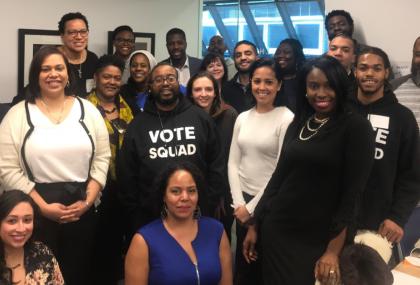
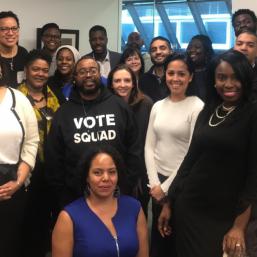
On March 5, CPD joined allies Law for Black Lives, PolicyLink, BYP 100 and The Leadership Conference on Civil and Human Rights to convene an all-day conversation about working to develop and pass federal legislation that would repeal and replace the 1994 Crime Bill, which allowed for over-policing and mass incarceration to ravage our communities. With our allies, we gathered to think critically about how we will engage base-building groups across the country in order to reform this piece of legislation that has negatively impacted Black and Brown communities for more than 20 years.
The meeting took place in Washington, DC and is the first step in developing what we are calling, “Freedom To Thrive” legislation that will acknowledge and begin to repair the harmful, ineffective, and wasteful aspects of the 1994 Crime Bill, while advancing a new vision of security and safety for our communities. With a major election on the horizon that is surfacing criminal justice as a significant societal issue, it is vital that we intervene with our vision of divesting from criminalization, incarceration and surveillance and reinvesting in the health, safety and wellbeing of Black and Brown communities.
When the 1994 Crime Bill passed, the legislation faced widespread criticism from criminologists, civil-rights lawyers, community activists, and numerous members of Congress. Today, advocates, organizers, and even elected officials who had previously supported the bill, recognize its flawed nature and the need to remedy the damage that has been done. In particular, draconian punishment and imprisonment, paired with increased resourcing and militarization of police did not make communities safer, but instead contributed to mass incarceration and criminalization, destabilizing an entire generation of Americans and their families, with a particularly destructive impact on Black communities. Complimenting “Freedom to Thrive” work at the local level, this federal expression serves to build the capacity for our larger vision of replacing this legislation with a modern public safety bill and galvanize collective action.
The CPD Network was represented by: SPACES in Action (DC), Ohio Organizing Collaborative, Good Jobs Now (MI), Black Leaders Organizing Communities (WI), One Pennsylvania, Maryland Communities United, Organize Florida, New Florida Majority and members of Local Progress.
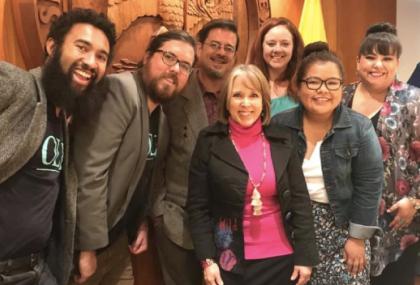
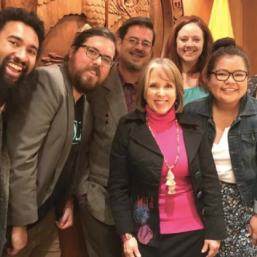
CPD affiliate members from OLÉ are celebrating an expansion of democracy in New Mexico after the legislature passed and Governor Michelle Lujan Grisham signed into law Same Day Registration and Automated Voter Registration on March 27. An estimated 300,000 people now have expanded voting rights thanks to these measures.
OLÉ believes "nothing about us without us is for us" and OLÉ members brought their voices to the legislature to make voting rights a central issue in this year’s legislative session. OLÉ members spoke with various law makers, testified in committees, wrote Op Eds, and appeared on a local news program to speak about the impact that voting rights have on every day New Mexicans. Watch OLÉ’s members Lauren and Eric on a CPD Facebook live stream discuss their work to advance democracy this session.
To expand voting rights OLÉ worked in coalition to draft and introduce two voting rights bills for Same Day Voter Registration (House Bill 86) and Automatic Voter Registration (House Bill 84). OLÉ organized, advocated and brought members of the community to the capitol to support their democracy bills. The legislation passed the House fairly quickly. The success of this is the result of the hard work of the coalition and rank and file members from OLÉ who pushed for its passage.
While this is a step forward for voting rights in New Mexico, the next fight is robust implementation to ensure the policies are as expansive and inclusive as possible and to ensure that government agencies that interface with the community are equipped to help register new voters.
Voting rights builds community power and every state agency should offer voter registration. OLÉ is fired up for implementation and CPD is excited to work with them to fight for a robust and inclusive democracy in New Mexico and beyond!



